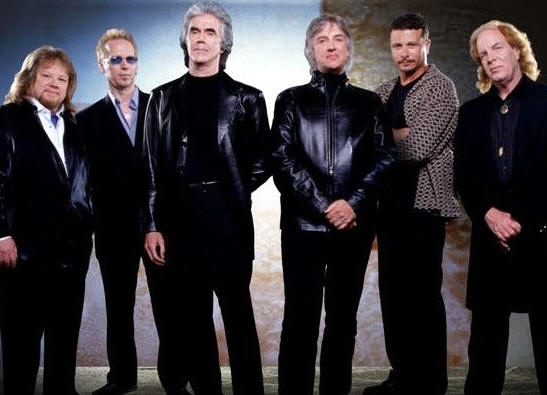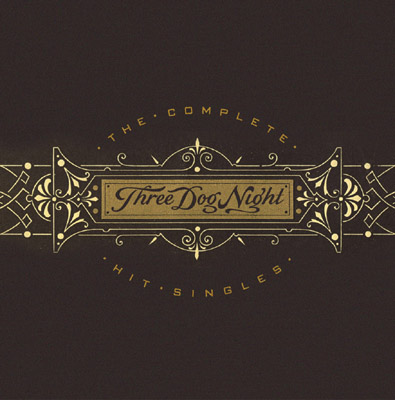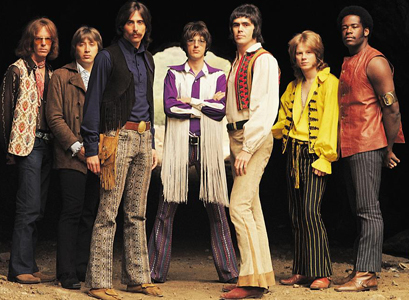

PopEntertainment.com >
Feature Interviews - Music
>
Feature Interviews P to T > Three Dog Night
 Three
Dog Night
Three
Dog Night
In Black and White
by
Ronald Sklar
Copyright ©2004 PopEntertainment.com.
All rights reserved. Posted: June 18, 2004.
The feat
would be impossible to achieve in today’s market-fragmented world, but back
in ’71, the bell-bottomed-and-walrus-mustachioed anthem “Joy To The World,”
by Three Dog Night, shone through the polluted air and permeated the
culture. In a world already torn every which
way but loose, Jeremiah the bullfrog and the wine we helped him drink were
on the lips of all the boys and girls now. The
tune, written by country singer Hoyt Axton and not by any of the three dogs
(Danny Hutton, Chuck Negron and Cory Wells), managed to roll out of the
mouths of babes, the Silent Majority, hippies and hardhats alike.
The simple wish of “joy to the fishes in the deep blue sea,”
and – even more unlikely -- “joy to you and me,” sent groovy vibes around
an essentially joyless planet, even underwater!
As ironic as
this was, the real story was that – despite, or even because of – the
tune’s mega-monster success, Three Dog Night was not considered hip. In fact, forget about “Joy To the World”:
the group and their three-part harmony scored an almost-unheard-of 21
Top-40 singles, including eleven Top Ten bestsellers, and twelve consecutive gold
albums. This was accomplished in an unlikely
musical-career lifespan of a staggering six years, wedged between Woodstock
and Watergate. Yet the band was often
branded with the unshakable stigma of “being too commercial.” This type of brand really smarts, and the
sting usually does not subside. The unfair
label did not help to keep TDN close to the hearts of the mean old rock
critics and the music Nazis who decide who and what is good for us. In fact, we’re still waiting for the Rock and Roll Hall of Fame
to get it together and recognize TDN for its creative arrangements, mystical
interpretations, and uncanny knack for recording the right tunes at the
right time.
So they
didn’t write their own music. Is that a
crime? However, they covered like nobody’s
business – tunes such
as Laura Nyro’s “Eli’s Coming,” Nilsson’s “One,” Randy Newman’s
“Mama Told Me (Not To Come),” John Hiatt's "Sure As I'm
Sitting Here," Paul Williams' “An Old Fashioned Love Song,”
“Celebrate” (not written by, but recommended by Neil Young) and Leo Sayer’s
“The Show Must Go On,” amongst others. Their
impassioned take on “Easy To Be Hard” was snipped from the Broadway tribal-rock musical
Hair, and Hoyt Axton scored for them again with the quirky “Never
Been To Spain.” So many covers, in fact,
that the boys made the cover of Rolling Stone magazine, in that
pop-culture-polarized summer of ’72.
At that time, the magazine was actually
considered the very barometer of hip. And
even then, appearing as the feature story of the counterculture’s favorite
rag, the editors felt the need to explain patiently and apologize
profusely: MORE GOLD THAN THE STONES! BIGGER
CROWDS THAN CREEDENCE! FATTER PURSES THAN
ELVIS! THREE DOG NIGHT: SEE HOW THEY RUN. As if this was hard to believe.
It took the
rest of the century for the story to unfold. Drug
abuse, lawyers, guns, money, and the whole VH1 Behind The Music
checklist played itself out. Now, in the
dawn of the new century, and with the release of their definitive greatest
hits collection, Three Dog Night - The Complete Hit
Singles (UTV/Geffen/UME), the
world is coming around again. The joint
plays like some mighty fine wine, timeless and, well, joyful. The
album has launched the guys back onto the Billboard album charts for
the first time since the mid-'70's. Even movie-critic god Richard Roeper shook
his booty from his aisle seat to give the boys props in a
salute in
The Chicago Sun Times. Roeper, no
pushover himself, said, “you can go 20-deep into the CD and still find an
instantly recognizable, well-crafted, beautifully harmonized pop gem.” Talk about your thumbs way, WAY up.
The
name Three Dog Night was coined from the Australian expression of it being
so cold that you would need to sleep with three dogs as opposed to one
(okay, it may not be Hoobastank, but this was the
era of such meaningful rock-group monikers as Ten Years After, Edison
Lighthouse and The Ides of March). Most of
the lead singing was done by Cory Wells or Chuck Negron, who had a book-length, dramatic history
all his own. Negron does not currently tour with
the two other members. We caught up
with band leader Danny Hutton, who is best
known for singing lead on
"Black and White," the group’s #1 smash from the
summer of '72. The song had originally been a British reggae hit.
He didn’t
sing lead on “Joy To The World,” (Negron did) but he does have an opinion on
the song. He says, “I didn’t get it, but to this day, I love it. I thought it was a goofy song. It was
the third release off the album.
We would try to find the ten songs that we liked the best. And they would do market research and get
feedback. I was shocked when that song hit.
It sold like ten million records. When
you listen
to the lyrics…'I’m a straight-shootin’ son of a gun' and
'I’d love to drink his wine'…it’s kind of a weird but universal song."
Hutton is an
Irish immigrant who spent his childhood in Boston.
He came of age – and in
the ‘60s, no less – in California. Hutton
hooked up with neighbors Jack Nicholson, Bob Rafelson (producer of The Monkees
and Five Easy Pieces), Neil Young and actor Harry Dean Stanton.
With friends like these, Hutton’s
wild days need no explanation; however, he has this to say: “I
partied hard, but I never got into any needle stuff or
heroin. My meter went off when I saw
junkies.”
Hutton’s
cleanup would come years after the band disbanded, in the late ‘70s. “I made enough money to retire,” he says,
“but I was completely screwed by that time. I
was completely burned out. I was done. Nothing
was fun. I faded out of the
group. I got unhealthy. I was boozing and doing coke. I
was so beat up looking. You know that
revelation when you really see yourself? I
just said, 'that’s it. I’m done.'
I quit smoking, drinking, pills, everything. Did
it all myself. This big, beautiful bedroom
and all I had in it was this mattress on the floor. All
those years caught up. Five months
later, I was running up to ten miles a day, which is too much! I eat health
foods. And I’ll drink wine or a good Belgian
beer, but I don’t smoke.”
Through it
all, he chose to stay in California.
“A lot of
cats come out to LA and do their deal,” Hutton says.
“And then they hit it big or they don’t,
but either way a lot of them wind up going back home and building their big
house. But for me, [LA is] home.
I remember Hollywood Boulevard in the fifties, when Fred Astaire would walk down the street.”
Seeing
Astaire walking down the street as opposed to dancing down the street may have
proved a bit of a letdown, but that didn’t stop Hutton from building his own
California dream. He eventually bought Alice
Cooper’s old house, and even though Alice doesn’t live here anymore, the
joint still rocks as if school’s out forever.
Hutton shares the place with his wife, children and an assortment of their
friends.
He says, “I have three boys. Three men, I
guess. Twenty-eight, twenty-two, and
eighteen. All musicians. As
Zorba the Greek said, ‘The full catastrophe.’
Wife, children, the house.”
Do they listen to his music? 
“No, of course not!”
And do the
pals of these young whippersnappers even know who he is?
“Yeah, I got
a record room,” Hutton says modestly. “You
hear [our] music all the time, so they know me from that. But they really know me as that guy who comes down and says,
‘Hey, guys, you gotta keep the door shut.’”
Today, along
with Cory Wells, Hutton criss-crosses the country singing these
old-fashioned love songs in – well – at least
two-part harmony. He says, “We’ve been
touring since 1986. We do 80 to 100 dates a year. We stopped that whole bus
tour thing around 1990, when my kids got a little too old.”
However, the
boys may not be too old for his sage musical advice. He says of his sons, “I tell them things and they go
'yeah
yeah yeah' and pretend they don’t hear me, and sometimes I hear them say
what I said to someone else.”
It’s actually
not too shabby to take advice from a guy who got his start, at the tender
age of 22, banging out ditties for the pop music division of Hanna-Barbera
Records. He penned would-be hits like
“Hippity Hoppity Kangaroo.” This lead to a
semi-successful, one-hit-wonderish career on his own with a modest seller in
’65 called “Roses and Rainbows.” The song
allowed him to tour with Sonny and Cher and lip-synch in 105-degree heat,
wearing leather pants and a tweed coat, on swinging shows like Where The
Action Is. Meanwhile, Cory Wells was
getting his own taste of the ‘60s, touring with a Beatle-esque group called
The Enemies. He hooked up with Hutton, and
then eventually with Negron. Brian Wilson –
that genius/surfer dude from the Beach Boys – took a special interest in
the three of them. Hutton, Negron and Wells
further developed their skills in Wilson’s house, formerly owned by Tarzan
creator Edgar Rice Burroughs and painted purple for
its good vibrations. Wilson called the boys Redwood and helped them record “Darlin’,”
which would eventually become a hit by the Beach Boys themselves.
Hutton
recalls, “[Brian Wilson] played me parts of Pet Sounds. It influenced
me, but what could you do with the influence? You
could never write or arrange a song as good as Brian.
The Beatles didn’t produce their own records. Brian did everything.”
Eventually,
though, the fame came. And then the
inevitable backlash.
“We got
nailed because we were eclectic,” Hutton admits, regarding the group’s
uncertain legacy. “We were all over the map.
We were on the R&B, pop and country
charts. But I think in the end, it’s going
to help us. There is not the same tone to
everything. Every song has a lead voice with
a strong three-part harmony all mixed up together like a horn section. We treated our vocals like a big horn section. We used our voices as horns. We
were the horn section. With only four
instruments, we had a big sound.”
The
original plan – well, there was no plan – was to get
their act together
and take it on the road.
“We were
driven,” he recalls. “Lightning striking
twice is so hard. I already had a little bit
of success, so to get the chance to actually [be successful] twice is
unbelievable. I knew we had great musicians
and singers. We just grabbed songs that we
liked to quickly get a show going.”
And the next
thing they knew, they were in the studio, with a cover of
Otis Redding's “Try A Little Tenderness”
being their first big hit.
“For the
first album, we were considered quote hip,” he says. “That all went away from the second album
on. Then they got into ‘they don’t write
their own songs.’ The record company was
picking softer selections. When we first
started, we were really banging it out. Real
hard rock. But the perception wasn’t that:
the perception was 'One,' or
'Easy To Be Hard.' Real
ballady stuff.”
 It
may have been lukewarm, but the act was
getting hotter.
It
may have been lukewarm, but the act was
getting hotter.
Hutton said,
“Once we started getting hot, then we started getting songs sent to us.
At the time, they were demo records. We
had a ‘for sure’ pile, a ‘maybe’ pile and a ‘no’ pile. The ‘for sure’ pile would be very small. I
kick myself in the butt a little bit now, because
I was always the studio guy. I didn’t come
from entertaining in clubs or live performance. I
came from the studio. I didn’t care that
much [about singing lead vocals]. Chuck and
Cory would fight over the lead more than me.”
There were
ego clashes, to be sure (“We were like a bunch of brothers. Every single group is exactly the same way.”), but the history was
made and the hits piled up.
Today, he
enjoys the song stylings of Eminem and the White Stripes, and he
toys with
his computer (“I don’t sit there and go nuts on it, but I can
e-mail and stumble around. I can Google!”)
He is also
very fond of feeling the love in the room when he tours. The
thousands who turn out know full well that he and Wells are more than just
two-thirds of that “Jeremiah Was A Bullfrog” group. He says, “We had more
consecutive Top 20 hits than the Temptations, and
we did it all in six years. We were history
in a way because we did all this and were considered not cool. It’s been rewritten in a way about how cool
we were.”
Joy to the
World indeed.
Email
us Let us know what you
think.
Features
Return to the features page
